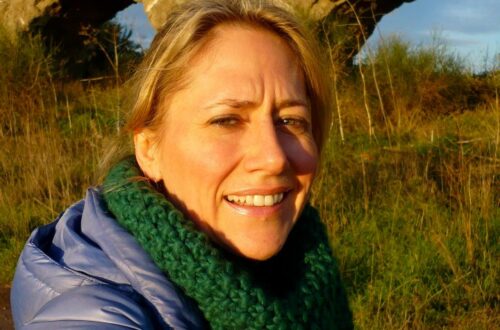Bramito
Featured in the January 2021 Issue of The Open Doors Review. View Magazine Here.
Fiction by John MacDonald
The young wolf paused at the forest edge and read the air. Behind, in the darkness, she could hear the stealthy movements of the pack; nearby, but hidden. Ahead, the open meadow sloped up to the skyline.
Here, the still air was heavy with the testosterone, breath, and blood of the rutting stags that had belled and clashed there all night. The lighter female odour meant that the hinds were coming into season. The bloody mucous sacs of their new-born would feed the pack next spring.
She carefully scanned the empty meadow before moving forward slowly, but directly, towards the craggy ridge. Tussocks of grass, boulders and stunted bushes; each held the scent of local and transient animals. *
A porcupine passed earlier, three chamois had visited two days ago, and the traces of the brown bear that had moved into the territory a year ago were still there after almost two weeks. The wolf stopped, listened, sniffed, and noted the position of vole nests that would become an important food source in the coming winter. She investigated an owl pellet, carefully gauging the proportion of mammal to beetle remains to add to her knowledge of prey density.
The pack was still adjusting to the sudden destruction of their territory, when the land shook, moved and cracked open. That night trees fell, rock faces collapsed, earth became liquid and slipped, paths were blocked, streams either changed course or disappeared.
And their prey animals fled.
One of their temporary dens had collapsed entombing an elder that was guarding a stockpile of food but the covering rockfall meant that it had been impossible to dig out.
Her restless search for food was given extra impetus because she knew that she was now of age to have her first litter. She already sensed, like the start of an itch, the minute changes that would soon overwhelm her natural restraint and propel her into the urgent frenzy of coitus. The pack leader had noticed too, and recently had begun to spend time near her, both to establish her receptiveness, and to deter other males from approaching her. Her readiness would depend substantially on how much food she ate during the winter months. If food was scarce, her season would be delayed for a whole year.
Behind the silhouetted ridge, the sky began to lighten, and the early morning dew rose to fill the meadow with a gauzy, drenching mist.
The wolf set off across the stags’ tillage for the summit and cut the trail of a fox where the vegetation thinned, and the surface became bare and rocky. She stopped. No urine or scat, only the scent from its pads as it ran, a few hours before, under the ridge line avoiding the lower slopes and the forest where her pack lived.
Reaching the narrow, rocky outcrop, she shook her coat dry and lay down, to survey the terrain falling steeply away on both sides.
Nothing unusual, no danger, nothing amiss; nothing that is, except the one thing that she could not work out.
The thing that she could not explain.
The scent that had disappeared completely from her world.
The scent of her man.
He was her man because she had always known him. He had adopted her while she was weaning; since her mother was killed. He had taken her and her brother to his den, an open but enclosed place with a lair where he had fed them, first milk, then solid food.
The pack knew where they were and visited every night after the man had gone away; close, but unable to reach them because of the enclosure. They could smell and lick the older wolves who would throw up warm, digested meat for them – even though they could smell the man on them, and in their surroundings.
As she and her brother grew bigger and stronger, the man visited less often and only threw whole rabbits or deer haunches into their enclosure. Now, when the pack visited, it was sometimes they who threw up food for the older wolves.
One day the man forgot to close them in.
They waited in the lair until he had gone then escaped and ran to find the pack. Their coats still carried the man’s scent so, understandably, they were set upon. But they were stronger now and able to defend themselves and find their place in the pack.
From time to time she saw her man or tracked his spoor, but, since the earth moved, he, like their prey, had fled.
She looked at the first rays of the new sun on the horizon, threw back her head and howled.
The pack replied and she loped down across the meadow to join them.
*
The man stood on the roof of the apartment building. He felt the slight shifting of the terracotta roof tiles under his weight and threw out his arms like a tight rope walker to adjust his balance. He inched forward until his toes overhung the gutter then lowered his arms to his sides.
From here, over the ridged rooftops, he could see the serene Adriatic, darker than the sky. The air was still, its silence respecting the sea’s gently imploring hush, hush. He could smell the sea’s faint odour and follow the twinkling lights describing the path of a small fishing boat.
Directly below, in his fourth-floor apartment, his neighbour, Signor Bartolucci, brewed coffee and smoked his first cigarette of the day. The squeaky pulley wheels below and left meant that Signora Betti was hanging out clothes that had been washed using the cheap night time tariff. Silvia’s alarm went off even though she had been retired for five years and, as always, she stopped it after the third ring. At the corner of the street the light went on in Carloni’s alimentari. In a moment Roberto would deliver today’s fresh bread from the local bakery.
Soloists in the town’s daily symphony, each brought in by an unseen conductor, they played their part; they belonged.
The man played no part.
He did not belong.
Rehoused here after the earthquake, along with his wife and all of the people from his town in the mountains, they had lost everything.
Buildings that had stood for centuries, the church, its bell-tower, all had collapsed fully or in part. Ugly cracks scarred ancient facades. Water, gas and sewage pipes suffered compound fractures. Roads were cut lengthways for miles making access, or fleeing, impossible.
Politicians promised immediate aid – funds, shelter, new homes – everyone would be fed and taken care of.
After days of living and sleeping in tents and makeshift shelters outdoors, days of entering shops, still in danger from aftershocks, for food and water, days without help or resources, the army arrived; first by air, then in trucks.
They registered and accounted for everyone before loading the entire mountain community into the trucks and driving directly to the coast.
The government had commandeered hotel accommodation. Hoteliers were pleased to have the low season business and the earthquake victims were relieved because at least their community was together.
At first, those with livestock despaired that they could not get back to tend them; sheep needed to be milked, poultry and dogs needed to be fed. The authorities thought that a pittance could compensate for generations of husbandry – as if an algorithm could understand the value of sheep hefted into a hillside for a century.
The community talked dialect together, ate together, wept together, went to church together – although fewer than before – and celebrated Christmas and New Year together.
The man sat apart; from the community, from his wife.
A ranger in the Sibillini National Park, he spent his days facing the distant mountains, reading the weather and anguishing over the managed wilderness he was forced to abandon. His nights, devoid of sleep, were filled with tormenting images of the two wolves he’d raised from cubs. How difficult it was to achieve the equilibrium between contact and distance, gaining their trust while perpetuating their natural fear of man; necessary precautions to ensure that the siblings survived long enough to be able to re-join the pack.
He tried to imagine how his animals made sense of a world suddenly torn apart by the earthquake.
He had to return.
His desperate call for permission was met with a terse, uncompromising refusal from an indifferent young man whose call centre script did not permit referral to a supervisor. It did, however, contain a warning that the army would shoot, as a looter, anyone found in the area. The youth told him to apply in writing for permission.
The application ran to forty-six pages and the man despaired at the effort bureaucracy had made to thwart him.
When they finally agreed, he joined a small group of town officials, escorted by soldiers, which permitted a two-hour visit.
The landscape, the habitats, the forests, mountains and open spaces that he loved so much were contorted, tortured, ugly.
And silent.
All that he was allowed, accompanied by his personal, armed, chaperon, was to visit his house; not the forest, not the mountain tops – not his wolves.
He returned to the coast, to his wife, to his community of exiles; at least in body, for his spirit remained in the broken mountain landscape.
Walking alone, at night, along the palm-lined esplanade, he spurned human contact and withdrew into a catatonic solitude where neither sustenance, nor his wife’s tender embraces, gave him solace.
News that the hoteliers wanted peak season prices provoked an immediate response from the government. The terremotati, whose sense of community was their only remaining possession, would be dispersed over a vast, flat, hinterland, where cheaper accommodation had been found.
The man slipped out of bed and, looking at the sleeping figure of his wife, dressed in his National wPark uniform before making his way to the roof.
He looked at the first rays of the new sun on the horizon, threw back his head and roared.
In the silence that followed, he closed his eyes and stepped off the roof.*
*Bramito is the Italian word for the bell of rutting stags, or the roar of a bear
*Massimo Dell’Orso – my friend – committed suicide on 1 May 2018. Orso is the Italian word for bear.
Author Bio: Mi chiamo John MacDonald e sono uno scozzese appassionato sia dell’Italia sia della scrittura. Tanti anni fa mia moglie organizzò una vacanza in Italia, e l’Italia rimane ancora oggi il suo più grande regalo per me. Ora viviamo circa quattro mesi all’anno nel nostro piccolo appartamento nel sud della Toscana, dove ci siamo stabiliti nella comunità dove anche cantiamo nel Corale Poliziana a Montepulciano.


